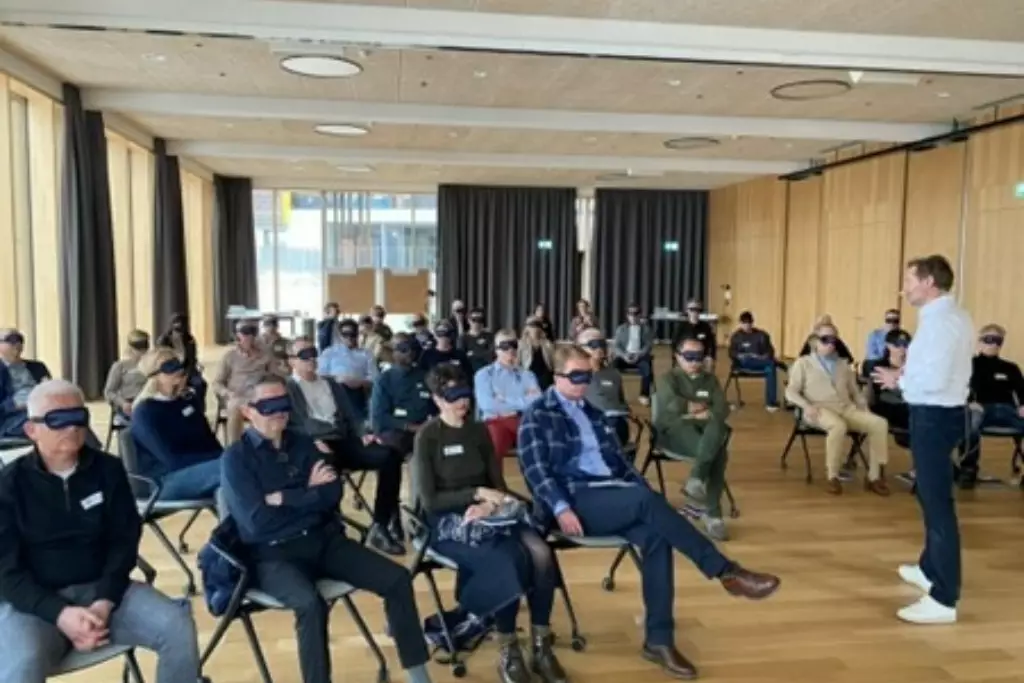Get in touch
Do you understand how you stand in the way of good and healthy relationships?

- Duration
- 7 min read
- Author
- By Ekkehard Kuppel
Dear friends,
There have been a handful of books I came across during my life that pushed me to a radically different perspective on myself and the world. Yuval Noah Harari’s book Sapiens was clearly one in this category. Collaboration being what makes our species special, and the power of stories to create such collaboration. And that a lot of what we believe in and follow are just… stories. Given the current state of our world, I also felt we needed a new story to assure a healthy future of mankind.
This summer I came across another book that shifted my perspective and understanding. And it could actually contribute to a better story for us and the world. At least for the male half of the population.
It started with a hint in Peter Attia’s book: Outlive. This is also a good book, summarizing relevant medical research and making practical guidance on how to get old healthy. After guiding us through obesity, heart disease, Alzheimer, diet, exercise, sleep and many more, he closes with the last chapter titled ‘Work in Progress - the high price of ignoring emotional health’. He shares his personal story as an (insecure) overachiever, and how his career performance overshadowed his difficulties as a husband, father, and in building and keeping healthy and caring relationship. He ends in several series of therapy, and he points us to his therapist’s book: Terrence Real ‘I don’t want to talk about it’, an exploration into the root causes of male depression, or to put it more mildly into many men's difficulty to connect with others.
Terrence Real published ‘Us’ earlier this year, and this is the one I want to encourage you to get and read. Bruce Springsteen wrote the foreword and thanked Terrence Real for having helped him save his marriage and family.
On the surface the book is about the therapist's learnings from couple therapy; each chapter is based on a real experience with his patients represented under made-up names. The common theme below the surface is that many men have experienced challenges in childhood or youth that pushed them to adapt, to protect and override their authentic, vulnerable self. Terrence Real tells heart breaking stories of abuse by fathers, mothers, other family members. But it doesn't require these horrible abuse situations to push a young innocent boy into an ‘adaptive child’. The absence of a caring parent, missing out on learning how to feel and deal with emotions, or the simple lack of physical touch or proximity can lead the young boy to close off and to numb his emotions. He ‘adapted’ his behaviors, put his guards up, with the objective to ‘function’ in such challenging environment.

A mental model is formed in those early years about ‘I am on my own’, ‘I need to be strong’, ‘I need to be in control’. What is fascinating is how such mental models become deeply engrained traits and can survive unchallenged for decades. It has led to many men operating with limited emotional intelligence with a focus on control, deliver, being strong and as a consequence to the difficulty to relate and connect with others. They believe that they are separate, a single individual that needs to perform. Ironically, such approach can be a useful platform for a business career: hard working, dedicated, achievement oriented men, pushing and pulling through difficult situations, coming out as winners at the other end of the tunnel. The mindset of the ‘adaptive child’ has served many men well in a high performing business environment where individual performance is valued and effective, at times harsh managers are celebrated. What is often hidden though, is the co-lateral damage that comes with this achievement: difficult relationships, failed marriages, neglected kids and not so great team experiences. Many fathers are unaware how they are repeating the patterns that they suffered during their childhood to their kids; it becomes an intergenerational perpetuation of the same old story.

I will not try to summarise Terrence Real’s book; I would like to share a couple of highlights that spoke to me when listening to the book and that might trigger interest on your end to get the full version:
- ‘Which version of you is showing up?’ Am I talking to the wise adult or to the triggered part of you, the ‘adaptive child’? Are you aware? Can you tell me?
- These are some traits that help you see the two different faces:
- the ‘adaptive child’ thinks ‘black and white' vs the wise adult sees ‘nuances’; perfectionistic vs realistic; relentless vs forgiving; rigid vs flexible; harsh vs warm; hard vs yielding; certain vs humble, tight in the body vs relaxed in the body;
- the ‘adaptive child’ is a little fundamentalist
- ’There is no redeeming value in harshness’; nothing any good has ever come out of harshness; harshness does nothing that loving firmness can’t do better!
- You cannot selectively numb your emotions; if you do not want to feel shame, guilt, sadness and numb them, you will also numb all the others, i.e. joy, connection, creativity, love
- You can do more than fight, flight or freeze
- Grandiosity is typically an expression of individualistic mindsets, they show judgmental, self-righteous, condescending behaviours rooted in a sense of superiority and individualism
- Grandiosity and shame are feelings on the same scale, the scale of contempt. Feeling superior or inferior are expressions of separateness, not together, not whole
- You cannot love from above or from below; love requires a healthy self esteem, one that accepts our perfect imperfections
- ’The legacy of individualism is loneliness'
- One needs to feel safe to allow vulnerability and showing one’s true self. Are you creating a safe space for the people around you? Are you aware how your judgmental mind creates separation and makes it unsafe to be around you?
- It is not difficult to see how such behaviors and mindsets as expressed by 'strong men' in a variety of countries are producing polarization, conflicts and ultimately bringing the world to its edges
- ’This world does not belong to us; we belong to one another'
- You are not separate; Gregory Bateson, the father of family therapy, calls the delusion that we are separate from one another ‘mankind’s biggest epistemological mistake’
- Ancient traditions have tapped into this collective wisdom and energy, they call it Xi, Dao, the force, Big Mind
- In addition to psychotherapy a variety of (spiritual) practices can support you on your journey: movement, meditation, dance, nature, psychedelic experiences
We all came to this world unique, vulnerable, dependent, and we will leave the world similarly unique, vulnerable, dependent. The idea that we needed to be strong, independent, free of emotions is a story that many have created to face a challenging environment as they grew up. It is never too late to question our own stories: how have they served us in the past? How are they not serving us anymore? How can we give birth to a new story?
What makes a great life? One of good and healthy relationships! This is true for personal and professional life; and also applies on larger scales between tribes, parties, peoples and nations.
I invite you to dig into ‘Us’; initially by reading or listening to the book. Then by sharing your insights and reflections with your loved ones. They will receive you and your process with open arms.
While this is not the focus of Terrence Real’s book, I can’t help but see so many opportunities to bring this awareness into the realm of business. You as leaders can become a better expression of yourself by connecting with yourself and others. Great teams are a lot more than the sum of individual performers; they fully embrace the power of vulnerability, leverage strengths, and co-create amazing outcomes. You can shape businesses that not only perform well but also stand out with a culture where each other is treated with care and respect. It is time for a better story for you, your teams and the world. Let’s embrace and celebrate ‘us’.
Sincerely yours,
Ekki
Latest Field Notes
More field notes that may interest you.

Go home - going home

Your Leadership Space – Obstacle or Enabler?
